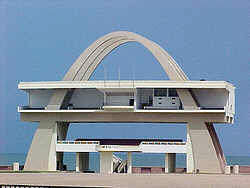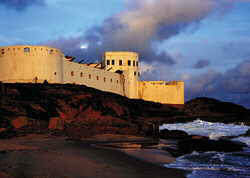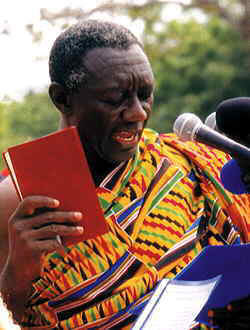 HISTORICAL BACKGROUND HISTORICAL BACKGROUND |
 1- General 1- General

Ghana is the First African Country, South of the Sahara to gain its independence from British Colonial rule on March 6, 1957.
Until then, the country was known as the Gold Coast, a name termed by the early Portuguese explorers who initially set foot on the shores of the country during the 15th century to aptly describe the country’s wealth in gold an natural resources.
During various periods from the time the Portuguese discovered gold in Ghana in 1471 to independence in 1957, the monarchs of several European Kingdoms, notably Denmark, England, Holland, Russia and Sweden, sent hordes of explorers and merchants to the country for its abundant wealth, both natural and human.
They battled for the control over the land and as a result, built forts and castles, which also served as trading ports.
The fact that 29 of the 32 European colonial forts and castles along the West African Coast are in Ghana, are reminders of the extent of European Colonial presence in the country.

 2- The Fourth Republic 2- The Fourth Republic
Under international and domestic pressure for a return to democracy, the PNDC allowed the establishment of a 258 members Consultative Assembly made up of members representing geographic districts as well as established civic or business organization. The assembly charged to draw up a draft constitution to establish a fourth republic, using PNDC proposals. The PNDC accepted the final product without revision, and it was put to a national referendum on April 28, 1992, which it received 92% approval. On May 1992, the ban on party politics was lifted in preparation for multi-party elections. The PNDC and its supporters formed a new party, the National Democratic Congress (NDC), to contest the elections. Presidential elections were held on November 3 and parliamentary elections on December 29 of that year. Members of the opposition boycotted the parliamentary elections, however, which resulted in a 200 seat Parliament with only 17 opposition party members and two independents.
| 
The Constitution entered into force on January 7, 1993 to found the Fourth Republic. On that day, Flt. Lt. Jerry John Rawlings was inaugurated as President and members of Parliament swore their oaths of office. In 1996, the opposition fully contest the presidential and parliamentary elections, which were described as peaceful, free, and transparent by domestic and international observers. In that election, President Rawlings was re-lected with 57% of the popular vote. In addition, Rawlings’ NDC party won 133 of the Parliament 200 seats, just one seat short of the two-thirds majority needed to amend the Constitution, although the election returns of two parliamentary seats face legal challenges.
In the December 7, 2000 elections, John A. Kufuor of the New Patriotic Party (NPP), won the largest share of the presidential vote with 48.17% of the vote, compared to 44.54.% for Rawlings vice-president and hand-picked successor, John Atta Mills of the NDC. The NPP also won 100 of the 200 seats in Parliament. The NDC won 92 seats, while independent and small party candidates won eight seats. In the December 28 run-off election, with pledges of support form the other five opposition parties, Kufuor defeated Mills by winning 56.73% of the vote and the NPP picked up one additional MP by winning a by-election, giving them 100 seats and a majority in Parliament. Both rounds of the election were observed, and declared free and fair by a large contingent of domestic and international monitors. President Kufuor took the oath of office on January 7, 2001, becoming the first elected president in Ghana’s history to succeed another elected president. |

